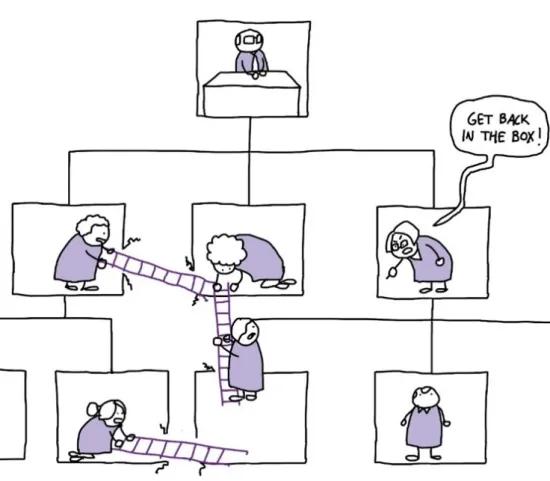The way you act, can influence progress toward circularity.
In earlier articles, we started looking at how to deal with complexity, as an organisation and as an individual. We tried to figure out how we can behave and found out that not only our role in our organisations, but also our personal leadership helps us make progress in circularity. While circular knowledge is useful, it probably isn't the most important factor for achieving circular success.
Adding circularity to economic thinking makes things more complex. But if we look at it from a social and wellbeing perspective, we can see that everything is connected. Complexity is like entropy – it's always growing. That's why we focus so much on dealing with complexity.
Dealing with complexity: a historical perspective
The Dawn of Everything, a recent publication by Graeber & Wengrow suggests that our societies are built on strong hierarchical structures, combined with robust bureaucratic processes. This might also be true for a lot of manufacturing companies.
Clear hierarchical structures are still the norm in the manufacturing industry, while alternative structures and approaches are more common in organisations dealing with transition and purpose like cooperatives, grassroots movements and collaborative networks (Ecopower, Mondragon, Cozywheels, Buurtzorg,…)
The bureaucratic part doesn't need much of an explanation, either. Just think about all the ERP, CRM, MIS, etc. and all the reporting that goes with them. As we said in the first article of this series, this 'control-approach' is great for predictable, linear problems, but it doesn't work so well for complex, unpredictable problems like circular innovation.
It seems that we need to find ways to act like people, even though there are all these rules and procedures in place. It seems we've lost our ability to innovate, take intrapreneurship and allow 'unproductive' playing and experimenting in this context. To make them more sustainable in the long term, we need to find ways to innovate and think differently about products, services and business models.
Is there anything we can learn from trailblazing organisations, or even nature?
If we combine the qualities of great leaders with the traits of pioneering circular companies, what do we find? We tried to put these pieces together and find some clear characteristics and insights. It turns out that these qualities are similar to those that make adaptation in nature successful.
Websites like asknature.org provide more than 1700 biological strategies in two categories (Functions and Living systems). Recent books (see illustrative literature list) seem to distil some highlights out of those living systems.
Let's revisit these capabilities. We might have forgotten about them over time, but they've stood the test of time and proven their worth.
Good leadership is decentralised
As we said in the last article, leadership isn't just for the top people in the company. It's for everyone. But the way you influence others might be different for each person. The indirect impact of your actions depends on how you approach them, not on your position in the company. In successful companies, leadership is shared and spread across the whole company. It is decentralised.
Allow open-endedness and evolution
It's all about taking a flexible approach to decisions and actions. This means that the decisions made by leaders don't necessarily have a predictable outcome. When it comes to decisions and actions involving colleagues, partners, and so on, there's always an element of unpredictability and complexity to consider.
The good news is that this also means you can react or behave differently to what is 'expected' or predicted. This is where you can take your 'form of freedom' to disengage yourself from the hierarchical or bureaucratic constraints. Allowing open endings, emerging knowledge and structures in your leadership means you can grasp opportunities and reduce risks. It creates an environment where valuable things can happen.
Face it, you can’t know it all
Good leaders are okay with not having all the answers. A leader who's open to 'not knowing' is more likely to ask questions and learn, which helps build trust. That's why we often say, 'learning before earning'. When you're starting out in the unknown (like the circular economy), it's all about learning. After a while, you'll start to see the real opportunities. Then, don't get too confident, stay humble and accept your ignorance when you want to scale your circular business.
These blogs illustrate this value of being humble and ignorant:
Invest Smartly in Circular Projects
‘Get out there’ and ‘be humble’, strange keys to circular success
Embrace ambivalence
Finally, circular leaders accept non-binary and ambivalent situations. They know that situations are not always right or wrong, but more nuanced. If you only see black or white, how do you deal with real colours? A circular business model for a product can be good or bad. It depends on many things, like customer segments, regions, stakeholders, and existing business models. Answers like "It depends" show that circularity is not always straightforward.
This blog goes into more detail about an ‘It Depends’-situation where it's not so clear-cut, looking at the life cycle impact. The article looks at the environmental impact of remanufacturing energy-using products. There are lots of different scenarios, and a lot depends on the assumptions and conditions in each one. All these dependencies affect the process.
Connect by focusing on trust
As a leader, you need to be able to connect with yourself and your team members or partners. This helps you to be honest with yourself as a leader and to rebuild trust when needed. Paying attention to how you engage with people is really important in a leadership role.
It's a good idea to ask yourself 'How do we actually interact with each other?' to understand more about the interpersonal dynamics at play. It's essential to create a culture where people feel safe and trusted so that ideas can be turned into actions. This requires accepting differences. The feedback culture in your organisation or team is a great place to start.
More info about building trust was described in the following blogs:
Dynamics and enablers to speed up your circular entrepreneurship
Setting up product-service combinations in practice, a matter of trust
No such thing as a born leader
The good news is that we can all take up good circular leadership. There's no need for expensive training programmes or to know everything. As long as we stay curious, eager to learn, know we don't know it and embrace the 'It depends' attitude, we're already halfway there. The tricky part is that we need to reflect on our own behaviour in relation to the characteristics described. The hard part is to experiment, try out, do different things than we used to do to further nurture our growth in leadership.
We hope you have the courage to take the next small step into circular leadership.
At Sirris, we help people in all kinds of roles in companies to get to grips with the challenges of the circular economy. We'd love to know if this information was helpful for you. Send us your feedback, reflections, suggestions, cases or examples.






